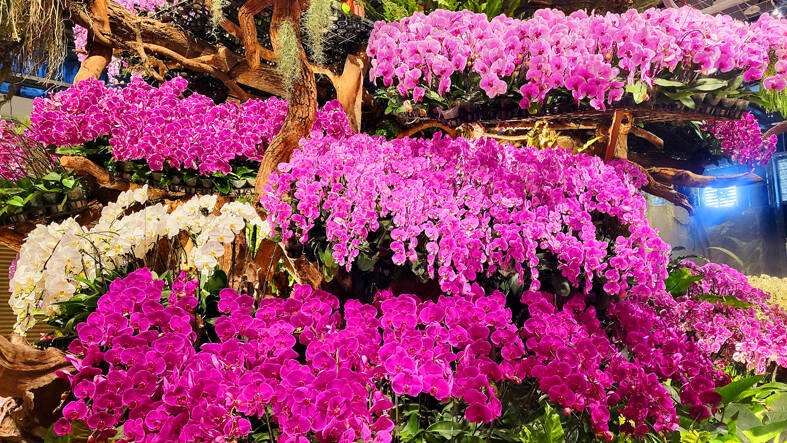Agriculture and Food Agency Director-General Hu Jong-i (胡忠一) has held a forum in Pingtung County with orchid producers to discuss the possible impact of US tariffs on Taiwanese phalaenopsis, or moth orchids, an important export product to the US.
The government would take three approaches to boost the industry’s resilience, Hu said at the forum on Wednesday.
First, it would provide financial assistance by subsidizing interest on loans to cut costs, he said.

Photo: Wang Mei-hsiu, Taipei Times
Second, it would provide guidance in cultivation and production technology to boost competitiveness.
Third, it would encourage market expansion by increasing sales in the US and driving consumption in the domestic market, he said.
The government would also promote the use of moth orchids for religious ceremonies or in Matsu temples across Southeast Asia, Taiwan Orchid Breeders Society secretary-general Yang Yi-ping (楊怡萍) said.
Taiwan’s moth orchids are world-leading in terms of quality, variety and technical innovation, Yang said.
Ministry of Agriculture statistics showed that last year the nation’s orchid industry was worth NT$18.6 billion (US$570.4 million), of which exports accounted for NT$6.54 billion, Hu said.
Moth orchid exports totaled NT$4.94 billion, with US exports making up 40 percent at NT$1.97 billion, the ministry’s statistics showed.
Earlier this month, US President Donald Trump announced a 32 percent tariff to be levied on Taiwanese goods, although the tariff was put on hold for 90 days on Wednesday last week.
Taiwan and the US would hold additional talks on tariffs after representatives of both sides held their first meeting on April 11, the Executive Yuan’s Office of Trade Negotiations said.
The Ministry of Agriculture has also announced an NT$18 billion support package for the agricultural industry, which might be adjusted depending on the outcome of the Taiwan-US negotiations.

Chinese spouse and influencer Guan Guan’s (關關) residency permit has been revoked for repeatedly posting pro-China videos that threaten national security, the National Immigration Agency confirmed today. Guan Guan has said many controversial statements in her videos posted to Douyin (抖音), including “the red flag will soon be painted all over Taiwan” and “Taiwan is an inseparable part of China,” and expressing hope for expedited reunification. The agency last year received multiple reports alleging that Guan Guan had advocated for armed reunification. After verifying the reports, the agency last month issued a notice requiring her to appear and explain her actions. Guan

GIVE AND TAKE: Blood demand continues to rise each year, while fewer young donors are available due to the nation’s falling birthrate, a doctor said Blood donors can redeem points earned from donations to obtain limited edition Formosan black bear travel mugs, the Kaohsiung Blood Center said yesterday, as it announced a goal of stocking 20,000 units of blood prior to the Lunar New Year. The last month of the lunar year is National Blood Donation Month, when local centers seek to stockpile blood for use during the Lunar New Year holiday. The blood demand in southern Taiwan — including Tainan and Kaohsiung, as well as Chiayi, Pingtung, Penghu and Taitung counties — is about 2,000 units per day, the center said. The donation campaign aims to boost

The Kaohsiung Tourism Bureau audited six hotels in an effort to prevent price gouging ahead of Korean band BTS’ concert tour in the city scheduled for Nov. 19, 21 and 22 this year. The bureau on Friday said that the audits — conducted in response to allegations of unfair pricing posted on social media — found no wrongdoing. These establishments included the local branches of Chateau de Chine, Hotel Nikko, My Humble House, and Grand Hai Lai, it said, adding that the Consumer Protection Commission would have penalized price gougers had the accusations been substantiated. The bureau said the Tourism Development Act

A preclearance service to facilitate entry for people traveling to select airports in Japan would be available from Thursday next week to Feb. 25 at Taiwan Taoyuan International Airport, Taoyuan International Airport Corp (TIAC) said on Tuesday. The service was first made available to Taiwanese travelers throughout the winter vacation of 2024 and during the Lunar New Year holiday. In addition to flights to the Japanese cities of Hakodate, Asahikawa, Akita, Sendai, Niigata, Okayama, Takamatsu, Kumamoto and Kagoshima, the service would be available to travelers to Kobe and Oita. The service can be accessed by passengers of 15 flight routes operated by